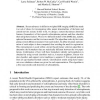Free Online Productivity Tools
i2Speak
i2Symbol
i2OCR
iTex2Img
iWeb2Print
iWeb2Shot
i2Type
iPdf2Split
iPdf2Merge
i2Bopomofo
i2Arabic
i2Style
i2Image
i2PDF
iLatex2Rtf
Sci2ools
MICCAI
2010
Springer
2010
Springer
Biomarkers for Identifying First-Episode Schizophrenia Patients Using Diffusion Weighted Imaging
Recent advances in diffusion weighted MR imaging (dMRI) has made it a tool of choice for investigating white matter abnormalities of the brain and central nervous system. In this work, we design a system that detects abnormal features (biomarkers) of first-episode schizophrenia patients and then classifies them using these features. We use two different models of the dMRI data, namely, spherical harmonics and the two-tensor model. The algorithm works by first computing several diffusion measures from each model. An affine-invariant representation of each subject is then computed, thus avoiding the need for registration. This representation is used within a kernel based feature selection algorithm to determine the biomarkers that are statistically different between the two populations. Confirmation of how well these biomarkers identify each population is obtained by using several classifiers such as, k-nearest neighbors, Parzen window classifier, and support vector machines to separate ...
Central Nervous System | First-episode Schizophrenia Patients | Medical Imaging | MICCAI 2010 | White Matter Abnormalities |
| Added | 14 Feb 2011 |
| Updated | 14 Feb 2011 |
| Type | Journal |
| Year | 2010 |
| Where | MICCAI |
| Authors | Yogesh Rathi, James G. Malcolm, Oleg V. Michailovich, Jill Goldstein, Larry Seidman, Robert W. McCarley, Carl-Fredrik Westin, Martha Elizabeth Shenton |
Comments (0)

